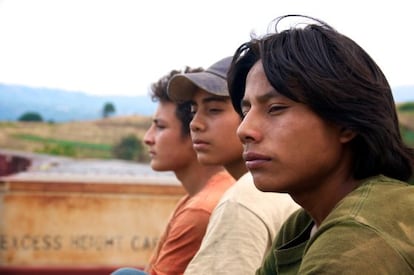From migrant train to red carpet
Ten years in the making, ‘La jaula de oro’ makes its last stop at Cannes


Diego Quemada-Diez wanted to tell the story of the migrants who cross Mexico to slip into the United States, so he jumped aboard La Bestía — “the Beast,” the nickname of the train on which they ride through. It is a journey that many have made before, but never with a camera, film crew and cast in tow. The director started out 10 years ago, investing everything in a personal project that is now reaching a prestigious final destination: this year’s Cannes Film Festival, which began this week, where La jaula de oro (The golden cage) will premiere in the Un certain regard section.
A taxi driver friend of Quemada-Diez — who was born in Burgos, Spain but has close links to Mexico — lived in Sinaloa, close to the tracks along which the train passes, and that’s where he started collecting hundreds of testimonies. The film may not be a documentary, but it is very real. “Everything that you see in the film has happened to someone at some time and they told it to me or I experienced it myself. The good things and the bad,” he explains the day before leaving for Cannes.
Accompanying him on his journey, both on the train and to France, were the three youngsters — Brandon López, Karen Martínez and Rodolfo Domínguez — chosen to star in the movie from 3,000 hopefuls who attended auditions in Guatemala and the Mexican state of Chiapas. None of them are professional actors, but on May 22 they will tread the same red carpet as Steven Spielberg, the president of this year’s Official Selection jury. They are the soul of a movie that also features 600 other participants who do not perform, all migrants getting on and off the train during their real-life journeys to a promise of freedom that could turn into a “golden cage,” as group Los Tigres del Norte sing in the song from which the movie takes its name.
Everything you see has happened to someone at some time"
“With this film we are not trying to convince the migrants not to leave their countries, only to put the spotlight on a problem that nothing is being done about,” explains Quemada-Diez, who says he is skeptical about the US’s proposed immigration reform. He says his intention is to release the film, a Spanish-Mexican coproduction, in the States “with the original title so emigrants identify with it and come to the theaters.” He also wants to screen it in the migrants’ origin communities. But as is often the case outside of the mainstream circuit, it does not yet have a release date, and Quemada-Diez will have to wait to see if any distribution deals emerge at Cannes.
Quemada-Diez’s role on the film went way beyond that of a director; he is almost a scholar on the subject. Since he started compiling testimonies a decade ago, he has seen the treatment of migrants get worse and worse. He has accompanied them on their journeys, and they have pointed a gun at him on more than one occasion. All this while also working as a camera operator on films such as Alejandro González Iñárritu’s 21 Grams and Fernando Meirelles’ The Constant Gardener.
The film brings the indigenous Mexican language of Tzotzil to Cannes via the lips of 17-year-old Rodolfo Domínguez, who hardly speaks any Spanish — only what he learned during the shoot. He knows that after his adventure in France he will return to his community in the Chiapas Highlands, but isn’t sure if he wants to be an actor or not. Karen is more certain and has already done some street theater in Guatemala, while Brandon didn’t even want to go to the audition — his mom made him — but he got the part anyway. He says he wants to go to the US, home of his beloved hip-hop, as well as the Eiffel Tower. “I want to dance there and get them to record me on a cellphone so my buddies can see it.”
Migrants have pointed a gun at him on more than one occasion
Tu suscripción se está usando en otro dispositivo
¿Quieres añadir otro usuario a tu suscripción?
Si continúas leyendo en este dispositivo, no se podrá leer en el otro.
FlechaTu suscripción se está usando en otro dispositivo y solo puedes acceder a EL PAÍS desde un dispositivo a la vez.
Si quieres compartir tu cuenta, cambia tu suscripción a la modalidad Premium, así podrás añadir otro usuario. Cada uno accederá con su propia cuenta de email, lo que os permitirá personalizar vuestra experiencia en EL PAÍS.
¿Tienes una suscripción de empresa? Accede aquí para contratar más cuentas.
En el caso de no saber quién está usando tu cuenta, te recomendamos cambiar tu contraseña aquí.
Si decides continuar compartiendo tu cuenta, este mensaje se mostrará en tu dispositivo y en el de la otra persona que está usando tu cuenta de forma indefinida, afectando a tu experiencia de lectura. Puedes consultar aquí los términos y condiciones de la suscripción digital.








































